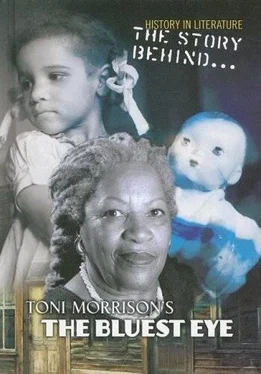So strong was her affection and zest for life, she did not eliminate the frail, sickly Elihue from it. She found his fastidiousness and complete lack of humor touching, and longed to introduce him to the idea of delight. He resisted the introduction, but she married him anyway, only to discover that he was suffering from and enjoying an invincible melancholy. When she learned two months into the marriage how important his melancholy was to him, that he was very interested in altering her joy to a more academic gloom, that he equated lovemaking with communion and the Holy Grail, she simply left. She had not lived by the sea all those years, listened to the wharfman's songs all that time, to spend her life in the soundless cave of Elihue's mind. He never got over her desertion.
She was to have been the answer to his unstated, unacknowledged question-where was the life to counter the encroaching nonlife?
Velma was to rescue him from the nonlife he had learned on the flat side of his father's belt. But he resisted her with such skill that she was finally driven out to escape the inevitable boredom produced by such a dainty life. Young Elihue was saved from visible shattering by the steady hand of his father, who reminded him of the family's reputation and Velma's questionable one. He then pursued his studies with more vigor than before and decided at last to enter the ministry. When he was advised that he had no avocation, he left the island, came to America to study the then budding field of psychiatry. But the subject required too much truth, too many confrontations, and offered too little support to a failing ego. He drifted into sociology, then physical therapy. This diverse education continued for six years, when his father refused to support him any longer, until he "found" himself. Elihue, not knowing where to look, was thrown back on his own devices, and "found" himself quite unable to earn money. He began to sink into a rapidly fraying gentility, punctuated with a few of the white-collar occupations available to black people, regardless of their noble bloodlines, in America: desk clerk at a colored hotel in Chicago, insurance agent, traveling salesman for a cosmetics firm catering to blacks. He finally settled in Lorain, Ohio, in 1936, palming himself off as a minister, and inspiring awe with the way he spoke English. The women of the town early discovered his celibacy, and not being able to comprehend his rejection of them, decided that he was supernatural rather than unnatural. Once he understood their decision, he quickly followed through, accepting the name (Soaphead Church) and the role they had given him. He rented a kind of back-room apartment from a deeply religious old lady named Bertha Reese. She was clean, quiet, and very close to total deafness. The lodgings were ideal in every way but one. Bertha Reese had an old dog, Bob, who, although as deaf and quiet as she, was not as clean. He slept most of his days away on the back porch, which was Elihue's entrance. The dog was too old to be of any use, and Bertha Reese had not the strength or presence of mind to care for him properly. She fed him, and watered him, left him alone. The dog was mangy; his exhausted eyes ran with a sea-green matter around which gnats and flies clustered. Soaphead was revolted by Bob and wished he would hurry up and die. He regarded this wish for the dog's death as humane, for he could not bear, he told himself, to see anything suffer. It did not occur to him that he was really concerned about his own suffering, since the dog had adjusted himself to frailty and old age. Soaphead finally determined to put an end to the animal's misery, and bought some poison with which to do it. Only the horror of having to go near him had prevented Soaphead from completing his mission. He waited for rage or blinding revulsion to spur him. Living there among his worn things, rising early every morning from dreamless sleeps, he counseled those who sought his advice. His business was dread. People came to him in dread, whispered in dread, wept and pleaded in dread. And dread was what he counseled. Singly they found their way to his door, wrapped each in a shroud stitched with anger, yearning, pride, vengeance, loneliness, misery, defeat, and hunger. They asked for the simplest of things: love, health, and money. Make him love me. Tell me what this dream means. Help me get rid of this woman.
Make my mother give me back my clothes. Stop my left hand from shaking. Keep my baby's ghost off the stove. Break so-and-so's fix. To all of these requests he addressed himself. His practice was to do what he was bid-not to suggest to a party that perhaps the request was unfair, mean, or hopeless. With only occasional, and increasingly rare, encounters with the little girls he could persuade to be entertained by him, he lived rather peaceably among his things, admitting to no regrets. He was aware, of course, that something was awry in his life, and all lives, but put the problem where it belonged, at the foot of the Originator of Life.
He believed that since decay, vice, filth, and disorder were pervasive, they must be in the Nature of Things. Evil existed because God had created it. He, God, had made a sloven and unforgivable error in judgment: designing an imperfect universe.
Theologians justified the presence of corruption as a means by which men strove, were tested, and triumphed. A triumph of cosmic neatness. But this neatness, the neatness of Dante, was in the orderly sectioning and segregating of all levels of evil and decay. In the world it was not so. The most exquisite-looking ladies sat on toilets, and the most dreadful-looking had pure and holy yearnings. God had done a poor job, and Soaphead suspected that he himself could have done better. It was in fact a pity that the Maker had not sought his counsel. Soaphead was reflecting once again on these thoughts one late hot afternoon when he heard a tap on his door. Opening it, he saw a little girl, quite unknown to him. She was about twelve or so, he thought, and seemed to him pitifully unattractive. When he asked her what she wanted, she did not answer, but held out to him one of his cards advertising his gifts and services: "If you are overcome with trouble and conditions that are not natural, I can remove them; Overcome Spells, Bad Luck, and Evil Influences.
Remember, I am a true Spiritualist and Psychic Reader, born with power, and I will help you. Satisfaction in one visit. During many years of practice I have brought together many in marriage and reunited many who were separated. If you are unhappy, discouraged, or in distress, I can help you. Does bad luck seem to follow you? Has the one you love changed? I can tell you why.
I will tell you who your enemies and friends are, and if the one you love is true or false. If you are sick, I can show you the way to health. I locate lost and stolen articles. Satisfaction guaranteed." Soaphead Church told her to come in. "What can I do for you, my child?" She stood there, her hands folded across her stomach, a little protruding pot of tummy. "Maybe. Maybe you can do it for me."
"Do what for you?"
"I can't go to school no more. And I thought maybe you could help me."
"Help you how? Tell me. Don't be frightened."
"My eyes."
"What about your eyes?"
"I want them blue." Soaphead pursed his lips, and let his tongue stroke a gold inlay. He thought it was at once the most fantastic and the most logical petition he had ever received. Here was an ugly little girl asking for beauty. A surge of love and understanding swept through him, but was quickly replaced by anger. Anger that he was powerless to help her. Of all the wishes people had brought him-money, love, revenge-this seemed to him the most poignant and the one most deserving of fulfillment. A little black girl who wanted to rise up out of the pit of her blackness and see the world with blue eyes. His outrage grew and felt like power. For the first time he honestly wished he could work miracles. Never before had he really wanted the true and holy power-only the power to make others believe he had it. It seemed so sad, so frivolous, that mere mortality, not judgment, kept him from it.
Читать дальше











